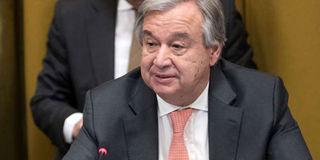It’s time aid agencies tackled claims of sexual abuse by staff

United Nations Secretary-General Antonio Guterres addresses the Conference on Disarmament on February 26, 2018 at the UN building in Geneva. The UN should rein in staff who perpetuate sexual harassment. PHOTO | JEAN-GUY PYTHON | AFP
What you need to know:
- Mr Forsyth resigned after revelations appeared in the media about his inappropriate behaviour towards female colleagues.
- Thanks to the #MeToo movement, more women in the aid industry have come out and spoken about the harassment they endured.
The resignation of Mr Justin Forsyth from his post as deputy executive director at the United Nations Children’s Fund last month may be a victory for victims of sexual harassment but it also reflects the UN’s rather lackadaisical attitude towards sexual predators.
Moreover, the Forsyth case barely scratches the surface of a much more insidious form of sexual abuse that continues to take place within the aid and humanitarian sector.
Mr Forsyth resigned after revelations appeared in the media about his inappropriate behaviour towards female colleagues when he was the boss at Save the Children.
Women who worked with him said he sent them text messages and emails that made them feel uncomfortable.
UNICEF
He apologised and eventually resigned from the children’s charity — but not before the organisation gave him a glowing recommendation for his next job at Unicef.
The resignation was followed by that of another UN official, Luiz Loures, the deputy executive director at UNAIDS, who was accused of sexually assaulting a female colleague.
Neither Mr Forsyth nor Mr Loures were fired from their jobs: Mr Forsyth resigned and Mr Loures decided not to renew his contract after his case was made public.
As Code Blue, a campaign by Aids-Free World, commented: “Throughout the world, prominent sexual harassers and predators are being fired.
"Entire industries — entertainment, tech, academia, legislatures and humanitarian organisations — have been forced to acknowledge their problems, name names and take immediate action. But not the UN….The UN offers the accused a dignified exit.”
OXFAM SCANDAL
As a result of these revelations, UN Secretary-General Antonio Guterres has formed an internal task force to look into the matter — but only a quarter of its members are female.
Those who know the inner workings of the UN do not believe that its recommendations will have an impact.
Recently, in the wake of the Oxfam sex scandal in Haiti, I wrote that it was unlikely that such scams would be exposed at the UN as the organisation is adept at cover-ups and women working there are too afraid to report sexual harassment or abuse for fear of retaliation.
However, since then, many more former UN employees have come out and spoken about the harassment they suffered while working there. This is good.
However, their cases tend to obscure the large-scale sexual abuse and exploitation of people who are, supposedly, being helped by these organisations — people whose cases do not make headlines and who will, probably, never get justice.
UN SOLDIERS
It is well-known, for instance, that UN peacekeepers are notorious for raping or sexually exploiting women and children that they are supposed to be protecting.
Despite the UN having admitted that there were 145 cases of sexual assault and abuse across its peacekeeping missions in 2016, none of the perpetrators has been apprehended — the UN says it is up to the countries that send the peacekeepers to handle the cases.
Women and children in poor countries destroyed by war or other disasters are vulnerable to sexual abuse or exploitation by peacekeepers and aid workers because they are more likely than men to have direct contact with humanitarian organisations.
COVER-UP
They are usually the ones who stand in line for rations and other types of aid during a crisis and are often targeted for medical and other interventions aimed at women and children.
“Transactional” sexual relationships thrive in such situations.
A Save the Children report on Liberia, for instance, showed that many girls believed that they had to sleep with UN or NGO staff before they could be given food.
The UN and other aid organisations often cover-up these cases because they fear their reputations will be tarnished.
The thinking behind this is that it becomes much more difficult for them to carry out their work if these revelations are made public, and that they might lose donor funding.
JUSTICE FOR VICTIMS
Thanks to the #MeToo movement, more women in the aid industry have come out and spoken about the harassment they endured.
But while sexual harassment within aid organisations is an issue that needs to be highlighted, let us not forget the thousands of women and children who have been sexually abused or exploited by peacekeepers and aid workers and whose cases may never be heard.
If humanitarian organisations are serious about tackling this issue, they must bring justice to these women and children as well.





